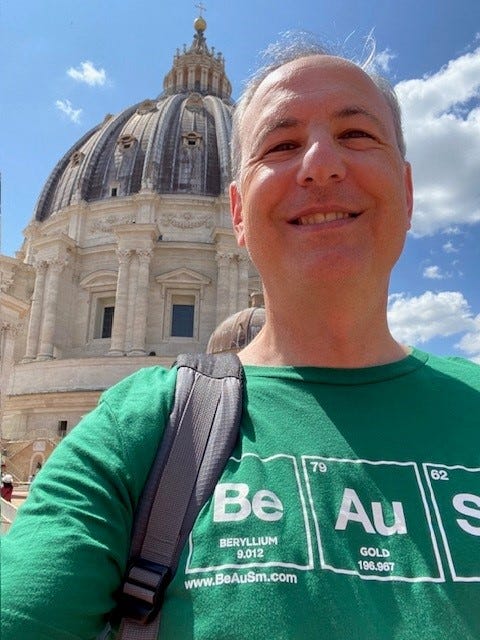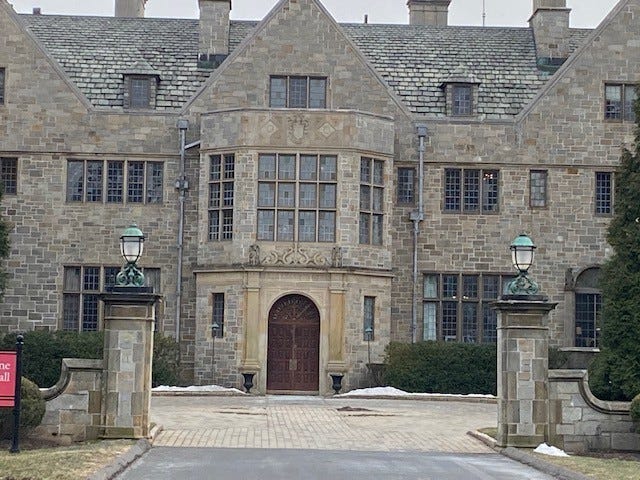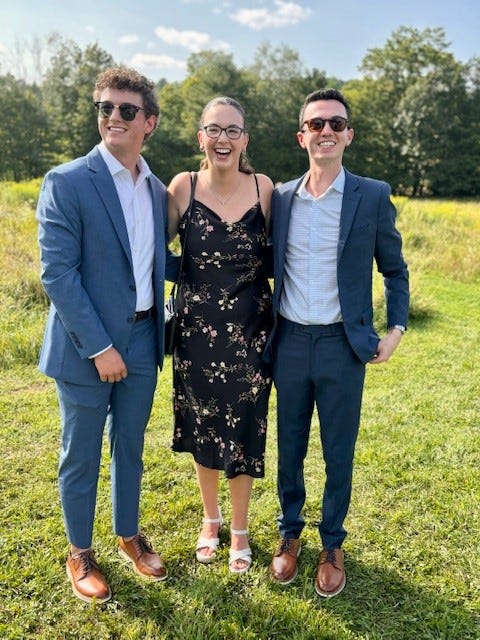Expect Less (And Why That’s Not as Harsh as It Sounds)
Commandment #7, the Conclave, and Embracing Doubt
Last week’s MARK. Set. Go..., The Puck Carrier Is Never the Last Man to Leave the Zone, brought back some powerful memories. A few readers wrote to say it reminded them of their own parents, coaches, and the quiet moments that still linger decades later. One longtime subscriber told me it brought “smiles and tears.” That kind of feedback—that kind of connection—is why I write.
That post led me back to something I first wrote in Ten Days With Dad, where I included my own set of commandments—lessons I’ve learned and try to live by. Some are deeply personal, and some are borrowed from people I admire, especially my dad. But all of them reflect what I believe matters most.
One that’s been on my mind lately: Commandment #7 — Expect Less.
At first, that might not sound very optimistic or contradict everything I’ve been writing about lately. Especially coming from someone who, just last week, urged readers to keep moving forward, to keep showing up, to pass the puck.
But it’s not about giving up or aiming lower. For me, "Expect Less" is a reminder to detach from the outcome—to give my best to a project, a relationship, a dream—and not let my happiness hinge on how it all turns out.
When I left my family business in 2013, I hoped everything would fall into place quickly. It didn’t, and the disappointment hit harder because of what I expected. If I had approached that experience with a little less certainty and a little more openness, I might have handled the turbulence differently—with more grace and less self-blame.
It’s when we convince ourselves that success is inevitable and doesn’t arrive on time or in the way we imagined that we spiral. We blame others. We turn on ourselves. And often, we get stuck, disappointed not just by the outcome, but by the story we’d already told ourselves.
Expectation and Control
"Expect Less" doesn’t mean "care less."
It means don’t confuse effort with outcome. Put in the work, practice, study, and dream, but don’t expect the world to follow your timeline. And don’t assign moral weight to the result.
You can do everything right and still not get the job, still not make the cut, and still fall short.
And when that happens, your worth isn’t any less. Your future isn’t any dimmer.
It just means you’re human.
That’s the real lesson, I think. The more tightly we grip expectations or certainty, the less room we leave for growth, surprise, or presence.
We all crave control. But the paradox is, the more we chase it, the more it slips through our fingers. Whether it’s our health, careers, relationships, or faith, we cling to certainty like a lifeline.
But what if letting go of it is where peace begins?
Doubt Isn't the Enemy of Faith—It's the Reason It Exists
This week, Coleen and I started watching Conclave, the 2024 film adaptation of Robert Harris’s novel, shortly after hearing of Pope Francis’s passing. There’s a line in the film, delivered by the fictional Cardinal Lawrence, that has stayed with me ever since:
“Certainty is the great enemy of unity.”
“It’s also the deadly enemy of tolerance.”
“Even Christ himself wasn’t certain at the end.”
His point? That genuine faith requires mystery. That when everything is known, there’s no room for wonder. And when there’s no wonder, there’s no need for faith.
That quote landed hard, maybe because it put into words something I’ve been feeling for years but hadn’t been able to name.
The older I get, the more I realize that genuine faith and real growth often don’t come from having the answers. They come from being willing to ask the hard questions and sit with them without rushing or resolving.
We want to believe that certainty is the reward for effort, or that it’s the natural byproduct of faith. But what if it’s not? What if certainty, as comforting as it can feel, actually limits us?
As a student at Fairfield, I attended the 10:00 p.m. Sunday Mass almost every week. It wasn’t out of guilt or obligation; it was because the Jesuit priests didn’t speak down to us. They didn’t preach at us. They talked with us—about life, relationships, stress, doubt, purpose, and everything in between.
That connection stayed with me.
Those Sunday night masses got me to wake up early on school vacation, walk the quarter mile from Beers Ave to St. Helen’s, and attend daily Mass. I sat near the front, often the youngest person there by a few decades. And still, it gave me peace. It gave me something to hold onto.
But the truth is, outside the church walls, I doubted everything: my GPA, my hockey performance, my friendships, and my place in the world.
Since COVID, I’ve barely stepped inside a church. My faith hasn’t disappeared. If anything, it’s become more personal. More integrated into my daily life. I pray every morning and evening. I find comfort in silence, reflection, and even writing this newsletter. But I don’t feel the pull to go back in the same way.
That certainty I used to find in a pew? It’s not gone—but it lives somewhere else now.
Coincidence, or Something More?
My dad was Jewish, and my mom was Catholic. The deal was to raise the kids Catholic, so they did. I went to Xaverian because Norwell didn’t have a hockey team, at least that’s what I told myself.
But I can’t help but look back now and wonder: was more going on? The rejections from every NESCAC school I applied to. The last-minute pivot to Fairfield. Was it just luck, or something else guiding the path?
That’s the mystery I’m trying to be more comfortable with.
I don’t need everything to make sense anymore. I don’t need to win every debate. I don’t always need to be right, or even certain.
In fact, I think I’m at my best when I let go of needing to know what’s next.
A Shift Toward Listening
For most of my life, I felt a deep conviction—certainty, really—that if something was on my mind, it had to be said. I believed truth-telling was always the higher road, no matter the moment, the mood, or the audience. I was certain that being honest—bluntly, immediately, and without filter—was the right approach.
Only it wasn’t. Not always.
It took me far too long to realize that timing, tone, and empathy matter. That sometimes, saying less is saying more. And that emotional intelligence isn’t about biting your tongue—it’s about knowing when your words will help and when they’ll only create more distance.
That kind of certainty—the kind that pushes us to speak before listening—can backfire. I’ve learned (slowly) to ask better questions, both of myself and others.
During a recent keynote, I shared three questions I’ve been working on asking myself:
Does this need to be said?
Does it need to be said by me?
Does it need to be said right now?
I’m not always good at this. In fact, for most of my life, I’ve been pretty bad at it. I interrupt. I push. I try to finish people’s sentences because I think I know where they’re going. But the more I slow down, the more I listen, the more I realize how little I truly understand—and how much better my relationships become when I accept that.
What I Hope My Kids Take With Them
Erin graduates from Fairfield in just a few weeks and will teach in the Fall. Sean is wrapping up year one at Bates and preparing for summer golf qualifiers. Campbell is driving his company toward unprecedented growth. All of them, in their own ways, are chasing big dreams—and inevitably, grappling with big expectations.
They’ll be seeking certainty:
Am I prepared enough?
Did I do the right things?
Will it be enough?
My advice?
Be cautious with certainty. When you expect it and don’t get it, you’ll be tempted to blame others, make excuses, or judge yourself too harshly.
Learn to sit with the questions instead of chasing answers.
And view uncertainty not as a threat, but as a gift.
So this week, I’m not trying to be right. I’m just trying to be curious.
About what I believe.
About how I listen.
And about what might be waiting just beyond what I think I know for sure.
I’m just trying to figure it out—one moment, one prayer, one play at a time.
See you next Tuesday.







This was a really good one Mark.
Love this so much, Mark. I have a saying that expectations are resentments waiting to happen. I have a transgender son who’s been estranged from me for 6 1/2 years.
Last month, my beloved daughter-in-law passed away, and although it took great courage, this son came to her wake and embraced his brother who had just lost his wife. I have no expectations about the future. A door opened ever so slightly, and it’s really up to him what his next steps will be.
In fact, in that room, all three of my sons who collectively hadn’t spoken to one another in 6 1/2 years, were there together and it made my heart sing. By her death, my daughter-in-law accomplished something I could not. I miss her terribly, but I am grateful for the silver lining.